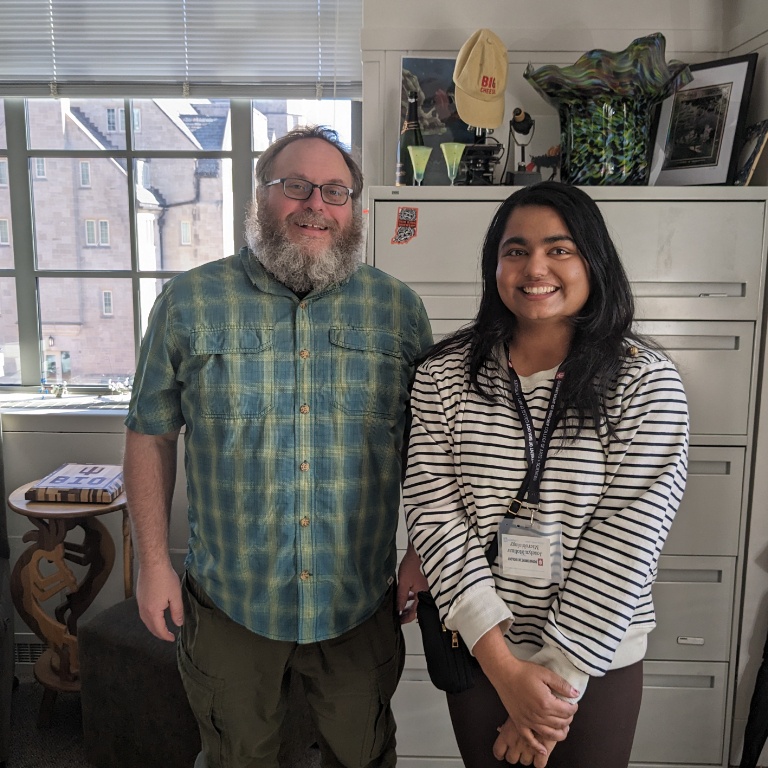Indiana University Bloomington graduate student Shefali Shefali has received the prestigious American Heart Association Predoctoral Fellowship supporting pre-doctoral and clinical health professional students pursuing careers in science, medicine, and related fields. The fellowship aims to improve global cardiovascular, cerebrovascular, and brain health.
Shefali, a fifth-year Ph.D. candidate in the Tennessen lab in the Department of Biology, studies the complex relationships between metabolism and development which can be leveraged to study cardiovascular diseases. Using the fruit fly Drosophila melanogaster as a model, her research explores how metabolic disruptions influence interorgan communication and contribute to disorders such as obesity, diabetes, and cardiovascular disease.
“My research seeks to understand how changes in sugar metabolism affects brain development – specifically, I’m interested in understanding how fat tissue and brain stem cells communicate with each other to ensure that the juvenile brain grows at the proper rate,” Shefali said. “These findings could have significant implications for understanding metabolic disorders and developing therapeutic strategies for CVD.”
Shefali said receiving the fellowship is an honor. “It’s incredibly meaningful because it signifies that my research is being recognized and valued by the scientific community,” she said. The award will allow her to dedicate more time to research and attend conferences and workshops to enhance her training and professional network.
After publishing her thesis and completing her Ph.D., Shefali plans to pursue postdoctoral training in metabolic signaling, focusing on how nutrient-sensing influences the brain-body axis. The AHA fellowship will also open up more avenues for her as she moves toward her postdoctoral training.
Shefali’s Ph.D. adviser and associate professor of biology, Jason Tennessen, said, “Shefali is an incredibly talented student who excels as both a scientist and community leader. This prestigious award from the American Heart Association is indicative of her talent, hard work, and dedication to her scientific community. I’m excited to see what the future holds for Shefali!”
Beyond her research, she is committed to mentorship, advocacy, and public engagement. “By conducting rigorous research, raising public awareness about nutrition and metabolic health, and advocating for trainees and early-career scientists, I hope to contribute to both scientific discovery and the development of a more empowered research community,” she said.
Shefali serves as the elected graduate student representative on Fly Board, an international advisory board for the Drosophila research community, working to expand access to resources and professional networks for early-career scientists.
“To further support early-career scientists, I am spearheading a new international effort – FlyCROSS – a mentor-mentee matching program for Drosophila early-career scientists,” she said. She was also recently selected as a correspondent for The Node, the blog of The Company of Biologists. In this role, she hopes to use her perspective as a trainee to bring up new professional development insights for early career researchers.
She credits her success to strong mentorship and support. “My experiences in the Tennessen lab and on the Fly Board have reinforced the importance of mentorship, leadership, and collaboration in scientific success,” she said. “Now more than ever, scientific communication and community building are essential.”
“As an international student, there are limited predoctoral fellowship opportunities,” Shefali said. “I could not have done this without Jason’s unwavering support. He had more faith in me than I had in myself. I am also grateful to Drs. Lesley Weaver, Soni Lacefield, and Richard Carpenter for supporting my application, and Dr. Harmit Malik for his invaluable guidance. I also appreciate the Drosophila community within and outside of IU for their feedback and support through conferences and seminars.”

 The College of Arts
The College of Arts